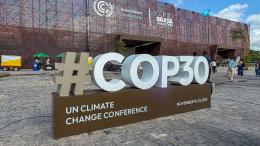A United Nations Day 2021 message from UNU Rector and UN Under-Secretary-General David M. Malone.
“Widespread, rapid and intensifying” is how the latest report of the Inter-governmental Panel on Climate Change describes the drastic changes being observed in global climate systems. We might similarly describe the transnational trend of climate litigation that could change how we frame the fight for climate equity.
To be successful, the upcoming U.N. Climate Change Conference in Glasgow (COP26) will need to address a host of unresolved issues in climate governance — including climate change adaptation financing and climate equity (policies to protect the poor and vulnerable populations most at risk).
Consensus on the way forward cannot be reached without meaningful multilateral cooperation. The U.N. secretary-general has forcefully argued in the U.N.’s “Our Common Agenda” report that a recognition of shared responsibilities is key and must guide international action on climate change.
Yet even as the United Nations attempts to leverage its formidable influence on the global stage for greater action on climate change, we are seeing the rise of a powerful alternative vehicle for achieving climate equity: the courts. Around the world, impatient citizens are suing their governments for lack of ambition and follow-through.
As of mid-2020, more than 1,500 climate change litigation cases had been brought in 38 countries. And a recent study found that, since 1994, a majority of such cases decided outside of the United States had outcomes favorable to climate change action.
Should bold, ambitious commitments elude government representatives in Glasgow, climate change litigation may overtake multilateral action. But while courts are a good tool for seeking redress and punitive action, other tools are required too. Achieving climate equity will require a full suite of options and strategies.
On this United Nations Day, let us consider how we can make our voices heard to convince world leaders to cooperate on the urgent global issue of climate change.
This article first appeared in The Japan Times.



